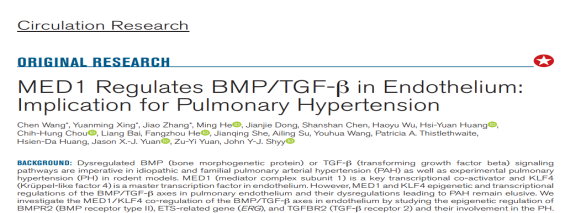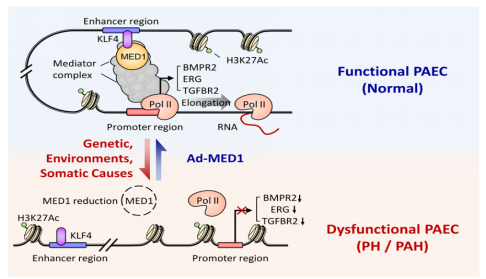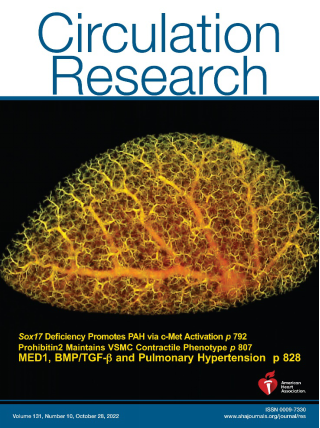Pulmonary hypertension (PH) is a life-threatening cardiovascular disease characterized by progressive increase of pulmonary vascular resistance and remodeling, eventually leading to the right heart failure. How to prevent the progression of PH and improve clinical prognosis has always been a challenging issue in this field.
On October 28, 2022, Professor Yuan Zuyi's team from the First Affiliated Hospital of Xi 'an Jiaotong University (XJTU) published an online article entitled MED1 Regulates BMP/TGF-β in Endothelium: Implication for Pulmonary Hypertension as a Cover Article in Circulation Research (IF: 23.2). The team found that the transcriptional co-activator of MED1 acted synergistically with the master transcriptional factor of KLF4 to regulate endothelial function by regulating chromatin remodeling and enhancer-promoter interactions, revealing the pathogenesis that dysregulation of MED1 and the resulting impairment of the BMP/TGF-β signalingis implicated in the progression of pulmonary arterial hypertension (PAH) and leads to PH in rodents.

In this study, RNA-seq, MED1 ChIP-seq, H3K27ac ChIP-seq, ATAC-seq, and high-throughput chromosome conformation capture together with in silico computations were used to explore the epigenetic and transcriptional regulation of BMPR2, ERG, and TGFBR2 by MED1 and KLF4, which proved the protective effect of MED1 on PH. Specifically, in normal pulmonary endothelial cells, MED1 and KLF4 could maintain the endothelial homeostasis by regulating the downstream signaling molecules. However, under PH or hypoxia conditions, the transcriptional regulation mechanism was destroyed due to the decrease of MED1 levels, leading to pulmonary vascular endothelial dysfunction. Exogenous supplement of MED1 could up-regulate the expression levels of downstream signaling molecules, thereby improving endothelial dysfunction and alleviating the progression of PH.

The First Affiliated Hospital of XJTU is the first author and the first corresponding affiliation of this article. Wang Chen, a young physician, Xing Yuanming, a doctoral student, and Zhang Jiao, a postdoctoral fellow from Department of Cardiology of our hospital, are the co-first authors. Professor Yuan Zuyi from our hospital, Professor John Shyy and Professor Jason Yuan from the University of California, San Diego in the U.S. are the co-corresponding authors
Article link:https://www.ahajournals.org/doi/10.1161/CIRCRESAHA.122.321532
